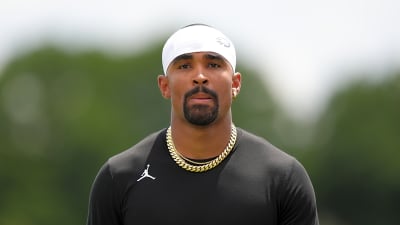
The quick answer? Yes and no. There are plenty of factors worth mentioning, but only limited clarity on most of them. What is clear, however, is that Vanderbilt is a must-win game. After dropping yet another contest to a Power Four opponent, the Hokies can’t afford to stumble against Vanderbilt without raising serious concerns about the direction of the season — and of the program under current head coach Brent Pry.
Considering that Pry is now 16-22 (42%) all-time as a head coach, it's paramount that Virginia Tech captures its home opener against the Commodores to avoid a fall to 0-2. But in order to elude loss No. 2 of the 2025 season, the Hokies must do something they haven't done since 2017: beat a Power Four opponent not in its own conference. Adding to that is the fact that Tech hasn't beaten a non-ACC Power Four opponent at home since Nebraska since 2009. So, what's leaning in the Hokies' favor?
First off, the air attack. Vanderbilt's passing defense ranked No. 97 in passing yards allowed per game (235.7). The Hokies would have tallied 249 receiving yards Sunday, had Ayden Greene's 28-yard reception not been wiped out by a chop block penalty. As it stands, two wideouts — Ayden Greene (71) and Donavon Greene (94) — tallied over 70 receiving yards this past Sunday, an encouraging sign for the showdowns to come.
In addition, the Hokies' front five should have an easier time defending against Vanderbilt's defensive front; after all, the Commodores don't have Dylan Stewart and possess a weaker defense across the board. Last season, Vanderbilt tallied the 84th-highest defensive grade in the country (75.9), according to Pro Football Focus' (PFF) metrics. In addition, the Commodores ranked No. 104 (0.08) in the Expected Points Added, Allowed Per Play statistic; that statistic measures how many expected points the opposing offense gained on average per play.
But what defines a team usually comes under center. And for the Hokies, Kyron Drones can't replicate an effort akin to what he did against South Carolina this past weekend. Drones' 42.8% accuracy against the Gamecocks on Sunday marked his career-low as a starter. Adding to his difficulties, the redshirt senior only accumulated 26 rushing yards on a dozen carries. Excluding sacks, that number then becomes 37 yards on 10 carries, with a high mark of only eight yards. For the Hokies to have a better chance against the Commodores this coming Saturday, Drones needs to either function better in the passing game than this past Sunday or step up his efforts on the ground.
What is a bright spot for Tech is that Drones tallied 221 passing yards, his highest in a single game since last year's season opener against Vanderbilt. The Hokies' conversion rate on third-down (8-for-18 - 44%) plays was 11% better than South Carolina's 4-for-12 (33%) mark. However, Drones threw one of his interceptions on third down, while his second came in a fourth-quarter, fourth-down situation that essentially closed the door on Tech's chances at victory.
The most concerning aspect of Sunday's game? How the offensive line dealt with pressure and how that, in turn, impacted Drones. Of Drones' 38 dropbacks, 17 of them came under pressure. According to 247Sports' Kolby Crawford, Drones notched a 90.3 PFF grade when operating in a clean pocket and a 31.9 grade when forced under pressure. In a clean pocket, Drones completed 12 of his 20 passes for a respectable 60% mark. However, when forced under pressure, Drones tallied only three completions on 15 attempts, registering a 20% completion rate.
Kyron Drones’ PFF grades vs. South Carolina:
— Kolby Crawford (@kolby_crawford) September 1, 2025
Clean pocket: 90.3
Under pressure: 31.9
So, defeating Vanderbilt and charting a better course for the remainder of the 2025 campaign comes down to two things: Drones cannot be forced into pressure as much as he was on Sunday. And No. 2: the offensive line cannot allow as many opportunities to surface.
However, there are bright spots; albeit, the majority of said spots come on the other side of the ball. The defensive line created some of Sunday's most luminous plays; redshirt freshman Emmett Laws notched three tackles, tallied a co-sack with linebacker Jaden Keller and forced a safety with Kelvin Gilliam Jr. on South Carolina signal-caller LaNorris Sellers. In addition, Kemari Copeland, back from a torn triceps injury that sidelined him midway through the 2024 campaign, tallied five tackles and co-registered a sack alongside Ben Bell on Sellers right before the end of the third quarter.
Aside from Sellers’ long touchdown strike to wideout Nyck Harbor, who broke free for a 64-yard score, the Hokies’ defense largely held firm, particularly in generating pressure on the quarterback. That pressure played into a known tendency for Sellers, who has shown a propensity to take sacks; the redshirt sophomore went down 33 times last season.
Harbor’s explosive touchdown highlighted South Carolina’s speed advantage, but Tech’s defense displayed noticeable resilience, showing signs of growth under new defensive coordinator Sam Siefkes.
Overall, while the Hokies' offense failed to reach the end zone for the first time since the 2023 matchup with Louisville, the game remained within reach for much of the afternoon. The defense kept Tech competitive until the fourth quarter, a sign of progress despite the loss. The pieces are there, but cleaner execution will be key if the Hokies want to consistently turn opportunities into points.
More must-reads:
- Urban Meyer offers passionate defense of Arch Manning after his poor performance
- Where these CFB teams must improve the most to win in Week 2
- The 'College football color teams' quiz
Breaking News
Trending News
Customize Your Newsletter
 +
+
Get the latest news and rumors, customized to your favorite sports and teams. Emailed daily. Always free!








